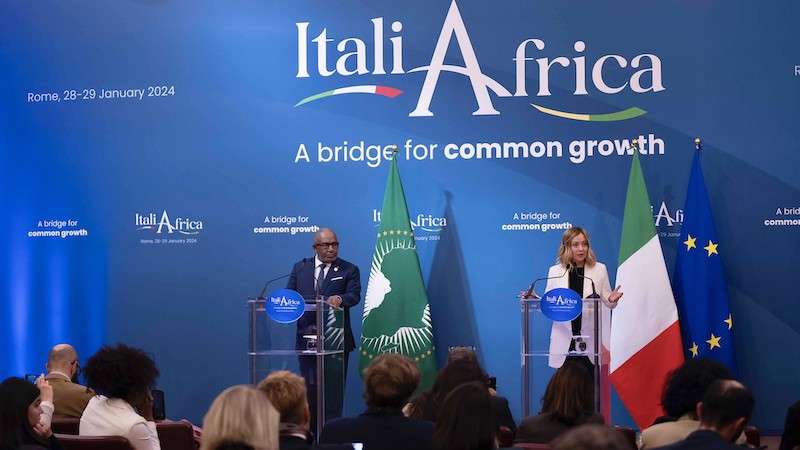Italy plans to channel billions of euros from its climate fund into a development programme for Africa that observers fear could promote fossil fuels and “false solutions” to global warming.
At a summit in Rome with two dozen African and European leaders on Monday, Italian prime minister Giorgia Meloni unveiled a long-awaited initiative aimed at boosting economic ties and curbing migration.
The transformation of Italy into “an energy hub” that creates “a bridge between Europe and Africa” is a central plank of the ‘Mattei Plan’ – named after Enrico Mattei, founder of state oil and gas company Eni.
Meloni said initial resources for the scheme would total 5.5 billion euros ($5.95 billion), including loans, guarantees and grants. Over half of the budget would come from a climate fund set up in 2022 to finance international projects in line with the Paris Agreement, she added.
Widespread concerns
Campaigners in Italy and across Africa have expressed concerns over the initiative.
Silvia Francescon, from Italian think tank Ecco, told Climate Home that the plan presents “enormous ambiguities” that leave the door open to fossil fuel investment.
A document released by the Italian government indicated the initiative would strengthen the use of renewables and “accelerate the transition of electricity systems”, but did not explicitly rule out oil and gas projects.
Zimbabwe looks to China to secure a place in the EV battery supply chain
“There is no reference to the Paris Agreement or the Cop decisions. Based on what we currently know, there is undoubtedly a risk that funds meant for climate and international development could be used for projects managed by companies like Eni”, she added. “The ambiguity is very worrying”.
Eni’s long shadow
Eni has extensive oil and gas operations across a dozen African countries, including Nigeria, Mozambique, Ivory Coast and the Republic of Congo.
Its CEO Claudio Descalzi attended the launch of the Mattei Plan in the Italian Senate alongside executives of other state-controlled companies.
At a political event organised by Meloni’s right-wing populist party last December, he said Italy was “ready to invest in Africa both to get the energy needed for economic growth but also to tackle migration flows”.
Cop29 host Azerbaijan launches green energy unit to sceptical response
Concerns over Eni’s looming presence over the initiative have been widespread ever since Meloni named the plan after the company’s founder.
Enrico Mattei led the company’s quest in the mid-20th century to capture a significant share of the fast-expanding market.
His willingness to give oil-producing states a larger share of the profits than its American and British rivals is widely credited as a key reason behind Eni’s success at the time. Mattei died in 1962 in a plane crash caused by a suspected sabotage.
Mutual benefits
Meloni hailed Mattei as an inspiration for her plan that, she said, would be “a cooperation among equals” and “non-predatory”.
But African Union Commission Chairman Moussa Faki Mahamat told the summit that African countries would have liked to have been consulted beforehand.
“We need to pass from words to deeds,” he said, striking a cautious note. “You can understand that we cannot be happy with promises that often are not maintained.”
The Italian government has put energy at the centre of the partnership but details of which energy sources will be included have been very limited.
Governments fail to agree timeline for climate science reports in fraught IPCC talks
Italy signed several gas deals with African countries over the last two years as it sought to replace Russian supplies. But gas was the “elephant in the room” at the summit, as Kenyan president William Ruto described it in his address.
Ruto said he believed “that no African country can be asked to halt the exploration of its natural resources, including fossil fuels”. But “that does not mean that it makes economic sense to build a dependency on fossil fuels in our economies”, he added, calling gas “a temporary solution, primarily for export”.
‘False solutions’
Among a limited number of “pilot projects” referenced in Meloni’s speech is a biofuel production operation launched by Eni in Kenya in 2021.
Supporters of biofuels see them as an important contributor to the energy transition away from fossil fuels. But critics argue they can do more harm than good by diverting land away from food production, destroying forests, worsening water scarcity and unleashing significant amounts of emissions across their supply chains.
Amazon nations to tackle rainforest crime together in donor-funded new office
Dean Bhebhe, campaigns lead at Power Shift Africa, called Meloni’s focus “very problematic”. “Africa has an enormous amount of solar and wind – genuine renewable energy sources – and instead she chooses a false solution like biofuels”, he told Climate Home.
Concerns have also been raised over the lack of engagement with civil society representatives that were not invited to the summit. Ahead of the event, over 50 African groups wrote a letter to the Italian government asking for an “end of neo-colonial approaches” and “a more consultative approach”.
“Currently the Mattei plan does not offer Africa a path to escape the systematic traps that prevent its development”, said Bhebhe. “We need plans that rebalance Africa’s position globally in truly innovative ways, not convenings that keep it at the bottom of the food chain”.
